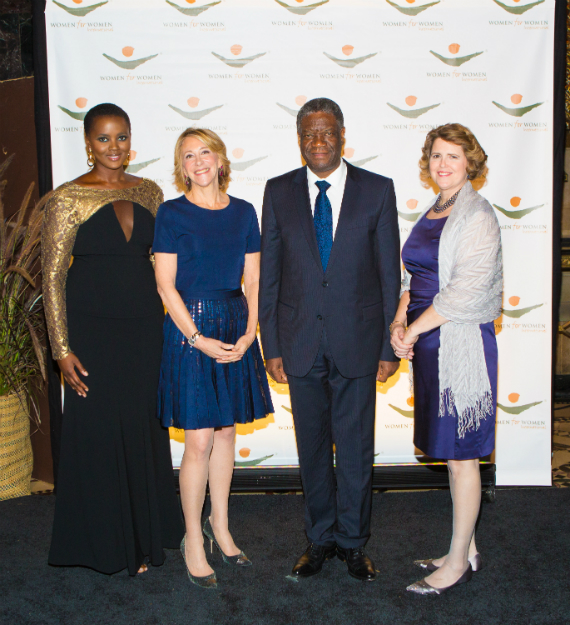
Today, December 10, we observe Human Rights Day, marking the 67th anniversary since the United Nations General Assembly adopted the Universal Declaration of Human Rights and the end of the UN's 16 Days of Activism Against Gender-Based Violence Campaign. It is a solemn reminder that individuals across the globe are still being robbed of their basic human rights including those of life, liberty and security, especially during times of war and conflict.
Women are hit especially hard in regions of ongoing conflict. Before, during and after conflict, women bear the brunt of the consequences of war. They are left as the providers and guardians, responsible for rebuilding their country one family at a time. Yet, they are often the most vulnerable casualties of war and conflict.
Last month, I was honored to host the annual gala for Women for Women International (WfWI), an organization dedicated to helping women rebuilding their lives after conflict and war. WfWI boasts an individualized approach in which the women who enroll in their one-year training program will come out with the tools they need to grow and thrive, enabling them to be equipped for life.
I learned about one such woman living in a rural village in the Democratic Republic of the Congo named Ishimalanga. She has survived the brutalities of war that claimed the lives of her mother and other family members. Through WfWI's program, she gained the support and confidence to take charge of her life. She learned to fish, and she now owns her own fishing boat, fishes and provides for herself and her family and she passes on invaluable knowledge to her children. It's these stories of survival and hope that inspire me and make me proud to work with Women for Women International.
I am from Ghana, and although Ghana is celebrated as a relatively peaceful country in a historically war-torn region, the issues of development and recovery are still apparent. I have personally seen how programs and initiatives that focus on empowering women, like the annual programs that WfWI run, are an effective long term solution for development. These programs not only provide for the needs of today, but for future generations to come.
While education is hugely important, the ways in which women are portrayed in their communities are equally important. Portraying women as victims keeps women in a captive space and denies them of their agency; their ability to fight back and take ownership of their situation. We need to not only address the issues and conflicts that create these problems, but also to create survivors who demonstrate resistance and growth. Women need to be empowered to shape their own livelihoods and become CEOs of their own lives. They must be allowed to take control of important life decisions that are so often decided by others. WfWI emphasizes that the women it works with are survivors and not victims. By changing the perception of women in society, we hope to see higher rates of women obtaining education and working in their governments. An increased political voice will allow women to be active participants in creating policies that will affect their lives.
The UN Secretary General Ban Ki-moon calls on us to use Human Rights Day as an opportunity to recommit to guaranteeing the fundamental freedoms and protecting the human rights of all. It is up to us to stand up as advocates for women and girls to be a part of the solution in a time where violence against women continues to make headlines, from ISIS in Syria and Iraq to Boko Haram in Nigeria.

Philomena Kwao with WfWI Board Chair Jan Rock Zubrow, Dr. Denis Mukwege, and WfWI CEO Jennifer L. Windsor at the Women for Women International gala. Photo credit: Rick Gilbert/Skyhook
One such advocate is Dr. Denis Mukwege, Founder and Director of Panzi Hospital of the Democratic Republic of the Congo and honoree of the WfWI's Champion of Peace Award. Dr. Mukwege has seen and treated thousands of women who bear the physical, psychological and emotional scars of violence. He gave a powerful and moving address about the need to engage men in particular to end violence against women, saying, "I call upon men to join women in the fight they have been in over the last 100 years for their basic and fundamental rights. The time is now, to stand in solidarity with women, for women." Other advocates who were in attendance at the gala include U.S. Ambassador-at-Large for Global Women's Issues Catherine Russell and Women for Women International CEO Jennifer L. Windsor.
Women are the backbone of every society, yet they are consistently bearing the brunt of the consequences of war. WfWI takes this group of marginalized women and empowers them to become survivors rather than victims. For this, I am extremely proud to be working with Women for Women International.
